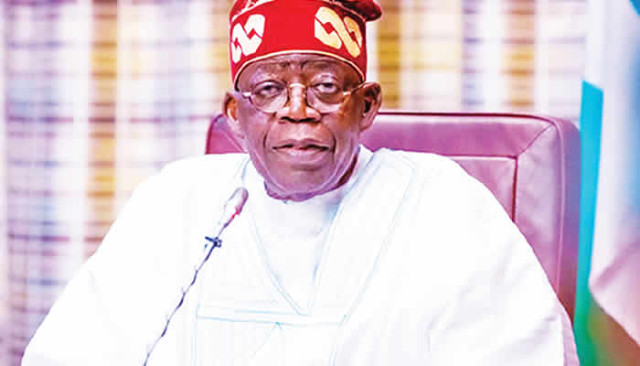President Bola Tinubu emphasizes that the reforms he has implemented over the last two years are establishing a sustainable groundwork for a more prosperous future for Nigerians.
Elected as President on May 29, 2023, Tinubu highlighted that his Renewed Hope Agenda aims to lower living costs, foster economic fairness, and create a business-friendly environment that draws investment and supports all Nigerians.
In a nationwide address marking his second anniversary in office, he proclaimed, “We are establishing the groundwork for shared prosperity, ensuring that no one is excluded.”
He expressed gratitude to Nigerians for their consistent support during challenging times and acknowledged their resilience.
As he reflected on two turbulent years, Tinubu commended citizens for their support in tackling inherited problems directly.
He remarked, “As we commemorate the second anniversary of my administration, I commend your steadfast spirit. While we have carried out reforms to invigorate our economy and strengthen our unity as a nation, I extend my gratitude for your unwavering faith in our shared vision to uplift our country.”
Two years ago, he accepted the solemn duty of leading the nation amid significant challenges. Together, they have met these obstacles with resolve.
He pointed out that to maintain the functionality of the Federal Government and the other tiers of government while catering to citizens’ welfare, it was imperative to eliminate long-standing fuel subsidies and harmful foreign exchange practices.
“These systems were unsustainable and had become a stranglehold on our nation,” he asserted.
Reminding citizens that the administration is halfway through its term, he reiterated the ongoing economic recovery efforts. “As of May 29, 2025, we look forward to sharing our progress in steering our nation toward socio-economic growth. When we started this journey fueled by hope and faith in Nigeria's unity and progress, I made a commitment to confront the nation’s challenges by rebuilding trust, promoting prosperity, and restoring economic health. Today, I proudly affirm that our economic reforms are yielding results, putting us on track to a more stable and prosperous nation,” Tinubu stated.
Under the Renewed Hope Agenda, he confirmed the administration's commitment to addressing economic instability, enhancing nationwide security, reducing corruption, reforming governance, and alleviating poverty. He acknowledged the hardships faced by citizens and expressed appreciation for their patience.
“We recognize the only alternative to our reforms would have led to a fiscal crisis resulting in rampant inflation, external debt defaults, fuel shortages, a declining Naira, and an economy in free fall,” he mentioned.
Tinubu presented indicators showing declining inflation, increased oil investments, and a robust fiscal performance.
He recognized ongoing pressures on living costs but noted clear signs of economic improvement. Price reductions in staple foods like rice and growth in the oil and gas sector reflect positive changes.
He announced a new strategic framework aimed at ensuring Nigeria's long-term fiscal stability and equity, emphasizing support for youth through a more favorable tax environment for digital jobs and exports.
Additionally, he detailed progress in revenue collection, with crude oil income meeting budget estimates, while fiscal deficits decreased significantly from 5.4% of GDP in 2023 to 3% in 2024 due to better revenue collection and transparency.
The government has stopped borrowing through Ways-and-Means, allowing the NNPC to contribute positively to the Federation Account and strengthening domestic fuel security.
Tinubu elucidated improvements in Nigeria's debt profile, noting that emergency borrowing has reduced, and key financial ratios have improved. The debt-to-GDP ratio, temporarily elevated due to currency revaluation, is now accompanied by a healthier debt-service-to-revenue ratio, which fell from nearly 100% in 2022 to below 40% in 2024.
He confirmed that IMF obligations had been met and external reserves grew from about $4 billion in 2023 to over $23 billion by the end of 2024. State-level income has increased significantly, allowing governors to manage debts, pay salaries, and fund critical projects.
On revenue policy, he announced extensive reforms aimed at broadening the tax base, protecting vulnerable households, and promoting inclusive growth.
The tax-to-GDP ratio rose from 10% to approximately 13.5% within a year, a shift credited to improved administration and a commitment to a fairer, growth-oriented tax system.
He mentioned the elimination of multiple taxes that burden small businesses and indicated that essential goods now have minimal or no taxes, increasing disposable income for workers.
Focusing on the solid minerals industry, Tinubu mentioned revitalization efforts that stimulate revenue and attract local processing investments. In healthcare, he cited the refurbishment of over 1,000 primary health centers, the upgrading of additional facilities, and improvements in cancer treatment accessibility. Progress continues in expanding health insurance coverage.
He maintained that robust security is essential for sustained economic progress, reporting enhanced coordination among military and law enforcement, along with improved personnel welfare.
He noted success in reclaiming territories from bandits and improving road safety.
Regarding education and job opportunities, Tinubu highlighted initiatives that improve access to higher education, infrastructure development, and support for young people.
He detailed projects aiming to enhance agricultural productivity and stabilize food prices, along with infrastructure upgrades supporting economic activities.
Wrapping up, he acknowledged the sacrifices made by Nigerians while striving to position the country for the future. “Our journey is still ongoing, but our direction is established. With God’s grace, we believe the worst is behind us. The real impact of our governance is becoming evident. The future is promising, and together, we will create a stronger, more inclusive Nigeria for all,” he concluded.




















